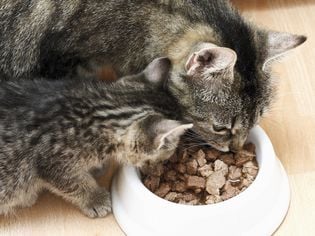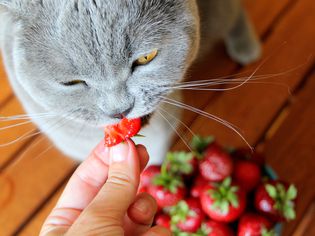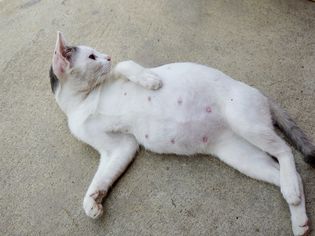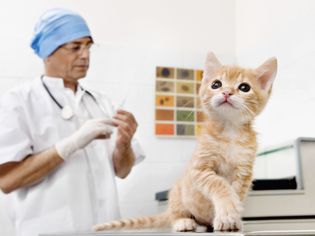Just like you, your cat may occasionally cough a time or two, and you don’t necessarily need to be concerned. However, if your cat’s coughing is becoming a regular ordeal or your cat seems to be having difficulty breathing, it’s time to rule out medical causes of cat coughing. Many causes of cat coughing are manageable with proper intervention, but some can be life-threatening.
Find out medical causes of coughing in cats and what you should do if you’re noticing this concerning symptom.
Common Causes of Cat Coughing
Cat coughing occurs due to irritation in the airways, including the trachea (windpipe), airways leading into the lungs, or the lungs themselves. The cough can be dry, or the cough can sound wet. Sometimes, the cough ends with your cat gagging something up.
The following are common causes of coughing in cats:
- Hairballs: While the retching up of a hairball isn’t a true cough, we’ve included it here because it’s commonly interpreted by pet parents as “coughing”. What your cat is doing is actually closer to vomiting than coughing.
- Respiratory infections: Bacterial, viral, fungal, and parasitic infections can all cause coughing in cats. This can be due to swelling and irritation in the airways, spasms in the airways, and increased mucus production in the airways. Infections can be restricted to the upper respiratory system or can extend deeper into the lungs, causing pneumonia.
- Feline asthma: When a cat has asthma, their airways become inflamed and constricted, and they develop mucus buildup within the airways. This all causes the cat to cough. Currently, it’s believed that asthma develops due to inhaled allergens.
- Heartworms: Coughing and asthma-like attacks are common symptoms of heartworms in cats. Cats can have an inflammatory reaction to migrating immature heartworms (heartworm-associated respiratory disease or HARD). Dying adult worms can also cause a dramatic respiratory response that may manifest as coughing, open-mouth breathing, and collapse. Unfortunately, the only symptom of heartworms in cats is sometimes sudden death.
- Tumors: Tumors in the airways, lungs, or chest can cause coughing. This can occur due to direct pressure on the airways or due to the production of fluid in or around the lungs. These tumors are more common in cats with feline leukemia virus (FeLV) or feline immunodeficiency virus (FIV).
Other Symptoms to Watch For
Other symptoms to watch for in your coughing cat include:
- Discharge from the eyes and/or nose
- Rapid or difficult breathing
- A hunched posture or other evidence of pain when breathing
- Bluish coloring of the tongues and gums
- Noisy breathing (grunting, wheezing, etc.)
- Open-mouth breathing
- Weight loss
- Collapse
When to See a Vet
You should see your veterinarian if your cat is coughing regularly or has signs of a respiratory infection, like discharge from the eyes or nose. It’s very important to seek a professional diagnosis for your cat to ensure you’re giving your cat the best treatment for their specific condition. Some of the conditions that cause coughing can mimic each other. For example, it’s common for feline heartworm disease to get misdiagnosed as feline asthma.
Seek emergency attention if your cat is collapsing, has a bluish tint to their tongue or gums, is open-mouth breathing with no obvious cause (such as exercise or anxiety), appears to be in pain, or is coughing up blood.
Home Remedies and Treatments
First off, if your cat is regularly coughing, you’ll want to see a veterinarian to determine the cause before relying on any home remedies or treatments. The most effective treatments for coughing are those prescribed by a veterinarian.
However, depending on the cause, you may be able to use one of these at-home management techniques to help ease your cat's symptoms:
- Steam: If your cat is regularly coughing due to something like a recurrent upper respiratory infection, exposure to steam may anecdotally help loosen congestion and clear airways. You can do this by shutting your cat in the bathroom with you while you take a hot shower. You can also use a humidifier to add moisture to the air.
- Antihistamines: Some antihistamines, like chlorpheniramine, can be purchased over the counter. However, you’ll want to speak with your veterinarian to determine the appropriate dosage to give your cat. You should not give your cat any medication without getting it approved by your pet’s veterinarian.
- Lubricating products: If your cat has hairballs, an over-the-counter product may help move fur through your cat’s gastrointestinal tract. You can also help your cat by regularly brushing them, especially if they have longer fur.
Prevention Tips
You won’t be able to prevent all causes of coughing in cats, but the following tips can help keep your cat cough-free:
- Keep your cat on year-round parasite prevention, including prevention that protects your cat from heartworms.
- Keep your cat’s vaccines up to date.
- See your veterinarian for regular checkups.
- Do not smoke indoors with your cat.
- Avoid using essential oil diffusers, which may cause respiratory issues in cats.
- Avoid spraying chemicals in proximity to your cat, including cleaning chemicals
- Brush your cat regularly to prevent hairballs.
- Avoid any known allergens for your cat.
- Keep your cat indoors.
If your cat is coughing regularly or experiencing difficulty breathing, it’s important to rule out medical causes of coughing. Some causes, like heartworms, can be life-threatening for cats. Make sure to contact your veterinarian if you’re concerned at all about your cat’s cough.







